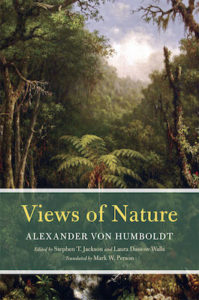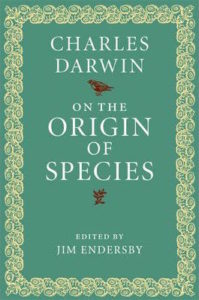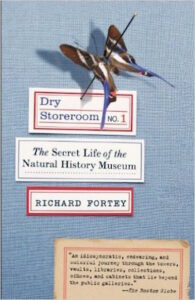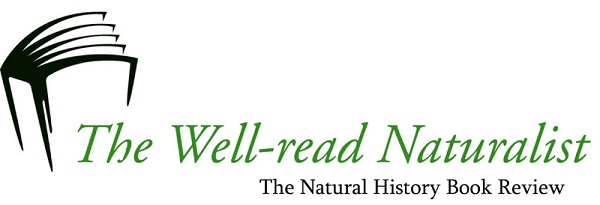As promised to a reader who inquired as to what books I would recommend to any naturalist, regardless of where on the planet they may live or study, I offer the following list of books that I consider as highly beneficial to anyone seeking to deepen their understanding of natural history. The list is, of course, woefully incomplete, and I most heartily welcome comments as to what other titles should be added to it.
 Alexander von Humboldt’s Views of Nature (the University of Chicago Press edition edited by Stephen T. Jackson and Laura Dassow Walls, and translated by Mark W. Person). The best known and, historically, most widely read of Humboldt’s works. Most today will never read more than a few sentences of this foundational naturalist; be a rebel, start with this one. And of course, in recommending one of Humboldt’s greatest works, I must also recommend one of Andrea Wulf’s: her award winning biography of him, The Invention of Nature: Alexander von Humboldt’s New World.
Alexander von Humboldt’s Views of Nature (the University of Chicago Press edition edited by Stephen T. Jackson and Laura Dassow Walls, and translated by Mark W. Person). The best known and, historically, most widely read of Humboldt’s works. Most today will never read more than a few sentences of this foundational naturalist; be a rebel, start with this one. And of course, in recommending one of Humboldt’s greatest works, I must also recommend one of Andrea Wulf’s: her award winning biography of him, The Invention of Nature: Alexander von Humboldt’s New World.
Gilbert White’s The Natural History of Selbourne. An excellent book to read just prior to or just following Humbolt, as the two together paint a diverse portrait of just how widely the range of natural history studies could – and can- be undertaken; on the opposite side of the globe or right in one’s own local patch.
John F.W. Herschel’s A Preliminary Discourse on the Study of Natural Philosophy. Admittedly, this 1830 work may be a bit to obscure for some, however it is foundational in the history of the development of natural history.
Charles Lyell’s Principles of Geology, Volume 1. The book that Darwin tool with him on the voyage of the H.M.S. Beagle – and the book that in many ways made his eventual publication of Origin possible. Kudos indeed to University of Chicago Press for keeping all three volumes of this classic work in print.
 Charles Darwin’s On the Origin of Species. I am particularly partial to the Cambridge University Press edition edited by Jim Endersby due to its superb fifty-six page editor’s introduction. I would also recommend that it be read in conjunction with David Reznick’s The Origin Then and Now: An Interpretive Guide to the Origin of Species from Princeton University Press.
Charles Darwin’s On the Origin of Species. I am particularly partial to the Cambridge University Press edition edited by Jim Endersby due to its superb fifty-six page editor’s introduction. I would also recommend that it be read in conjunction with David Reznick’s The Origin Then and Now: An Interpretive Guide to the Origin of Species from Princeton University Press.
Alfred Russel Wallace’s The Malay Archipelago. Wallace’s fascinating and fast-paced travelogue of his journeys and observations though the region. The preferred edition is the new annotated one as edited by John van Wyhe and published by The National University of Singapore Press.
Marston Bates’ The Nature of Natural History. Thankfully kept in print by Princeton University Press, this classic twentieth century work is a superb, very accessible examination of just what natural history is and how it continues to be relevant to a world that was at the time of its writing – and even more so now – increasingly becoming one of specialization and myopic fictionalization.
Rachel Carson’s The Sea Around Us. This 1951 work provides a splendid and highly readable overview of oceanography and marine biology. And although it is more limited in geographic range, I would also recommend Ed Rickett’s Between Pacific Tides for anyone interested in the life of inter-tidal zones (find a first or second edition if you can as the prose is more reflective of Rickett’s own hand, but if you can’t the re-edited fifth edition will also serve).
 Richard Fortey’s Dry Storeroom No. 1: The Secret Life of the Natural History Museum. Dr. Fortey’s lively and engaging tour of one of the world’s greatest natural history museums provides an excellent overview into the inner workings of these critically important institutions. To be frank, I would also recommend most all of his other books as well as he does such a superb job of making his topics both interesting as well as intelligible to the reader.
Richard Fortey’s Dry Storeroom No. 1: The Secret Life of the Natural History Museum. Dr. Fortey’s lively and engaging tour of one of the world’s greatest natural history museums provides an excellent overview into the inner workings of these critically important institutions. To be frank, I would also recommend most all of his other books as well as he does such a superb job of making his topics both interesting as well as intelligible to the reader.
John Wright’s The Naming of the Shrew; A Curious History of Latin Names. Although explanations of the workings of taxonomic naming can often be on the dry side, Wright not only makes the subject interesting but infuses his explanations with generous amounts of humor as well.
Finally, I would be wrong to conclude any such list without mentioning the extraordinary Very Short Introductions series from Oxford University Press. With over five-hundred volumes now in print, one-hundred-forty-two of which being on subjects classifiable under the category science and mathematics, and with dozens of these taking a natural history subject area as their topic, it is well worth the time to peruse their listing for whatever particular curiosity you are seeking to satisfy at the moment.

Whewell’s Gazette: Year 3, Vol. #28 | Whewell's Ghost
March 1, 2017 @ 08:54
[…] The Well-read Naturalist: Books for Every Naturalist […]